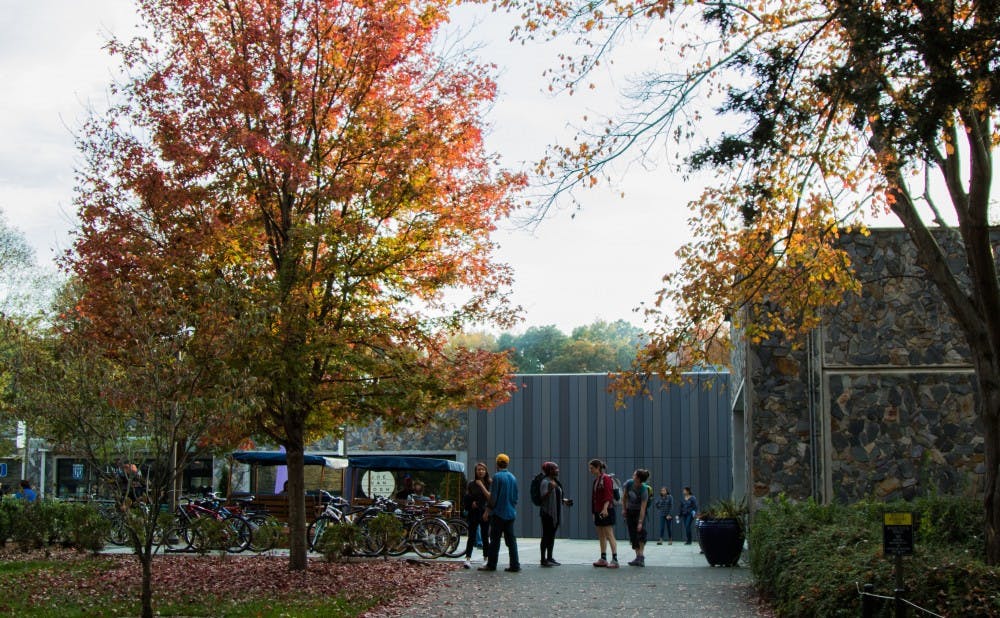A new grant will expand the University’s impact on the humanities—both on Duke’s campus and at other schools.
The Andrew W. Mellon Foundation has awarded Duke $3 million over five years to advance its humanities programs, build partnerships with liberal arts colleges and historically black colleges and universities as well as test out a new teaching partnership with Durham Technical Community College. The program, called Humanities Unbounded, will begin on July 1.
“We are grateful for the support of the Mellon Foundation, which will help us strengthen existing partnerships and forge new connections on our campus and beyond,” said President Vincent Price in a statement.
Humanities Unbounded is not the first Duke initiative focused on strengthening the area—it will follow in the footsteps of another program called Humanities Writ Large, also a five-year grant from the Mellon Foundation which melded humanities and social science research through labs that mixed undergraduates with graduate students and faculty.
The new program will build off HWL, developing nine new labs across a variety of subject areas. The English Department is currently piloting a lab called Representing Migration, which will continue into its second year.
Gennifer Weisenfeld, dean of the humanities and a principal investigator of the grant, wrote in an email that they plan to start two new labs next year.
“We are currently discussing possibilities with departments, but no themes have been decided yet,” she wrote. “We are particularly looking at thematic synergies among courses that are being offered next academic year.”
There are a few key aspects that distinguish these labs from the ones established under HWL.
While those labs were based out of the Franklin Humanities Institute and open to faculty across the University, the programs created by Humanities Unbounded will focus on benefitting faculty within the departments, Weisenfeld explained. Therefore, they will be tied to courses to create thematic intersections between the research and coursework.
By adding a lab meeting to the courses, they hope to increase the opportunities for discussions on intersections in topics and more supervised independent research projects.
“[The HWL labs] have become national models of extracurricular, project-based, collaborative work in the humanities,” she wrote. “What we want to do now is to tie that model more to our curriculum and departmental structures.”
In the future, she stated there will be an open call for participation and more opportunities for long-range planning, particularly in conjunction with course approval and registration schedules.
“While specific labs may not continue beyond the tenure of the grant, we hope to refine and sustain this model as we encourage faculty to explore linkages between their courses and create collaborative spaces/opportunities for students to do this kind of work,” she wrote.
A key aspect of the grant besides the creation of the new labs is establishing partnerships with other institutions to bolster the humanities teaching outside of Duke’s classrooms.
Under HWL, a Visiting Faculty Fellows program brought more than 20 scholars from HBCUs and liberal arts colleges into residence at Duke over the last six years, Weisenfeld noted. Humanities Unbounded will expand that program to give fellows a second year of funding to establish their projects when they return to their home campuses.
The program will also strengthen Duke’s connection to Durham Tech by piloting a teaching partnership with the local college.
“It creates exciting opportunities for our instructors to further enhance and develop their pedagogy, and that will have long-term benefits for our curriculum,” said William Ingram, president of Durham Tech, in a press release.
In the pilot, graduate student research assistants from Duke will partner with faculty at Durham Tech to work on teaching innovations. The projects could include creating online resources or collaborative research.
"We know that our faculty and graduate students can benefit greatly from the pedagogical expertise of Durham Tech’s excellent faculty members; and we look forward to the creative outcomes that this partnership will generate," wrote Edward Balleisen, professor of history and a principal investigator of the grant, in an email.
Get The Chronicle straight to your inbox
Sign up for our weekly newsletter. Cancel at any time.
Bre is a senior political science major from South Carolina, and she is the current video editor, special projects editor and recruitment chair for The Chronicle. She is also an associate photography editor and an investigations editor. Previously, she was the editor-in-chief and local and national news department head.
Twitter: @brebradham
Email: breanna.bradham@duke.edu

